初中英语外研版七年级下册Module 11 Body language Unit 3 Language in use 练习 (含解析)
文档属性
| 名称 | 初中英语外研版七年级下册Module 11 Body language Unit 3 Language in use 练习 (含解析) |
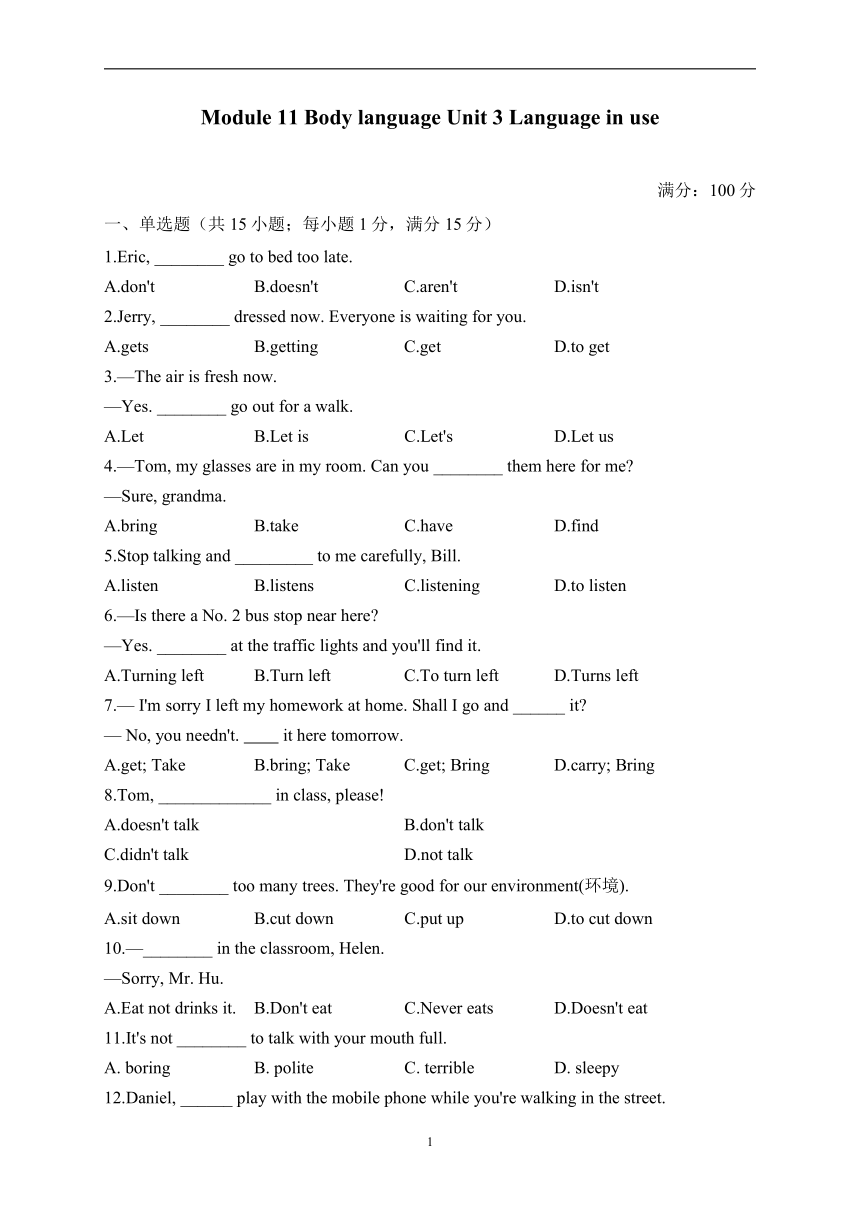
|
|
| 格式 | docx | ||
| 文件大小 | 57.8KB | ||
| 资源类型 | 教案 | ||
| 版本资源 | 外研版 | ||
| 科目 | 英语 | ||
| 更新时间 | 2023-09-13 00:00:00 | ||
图片预览

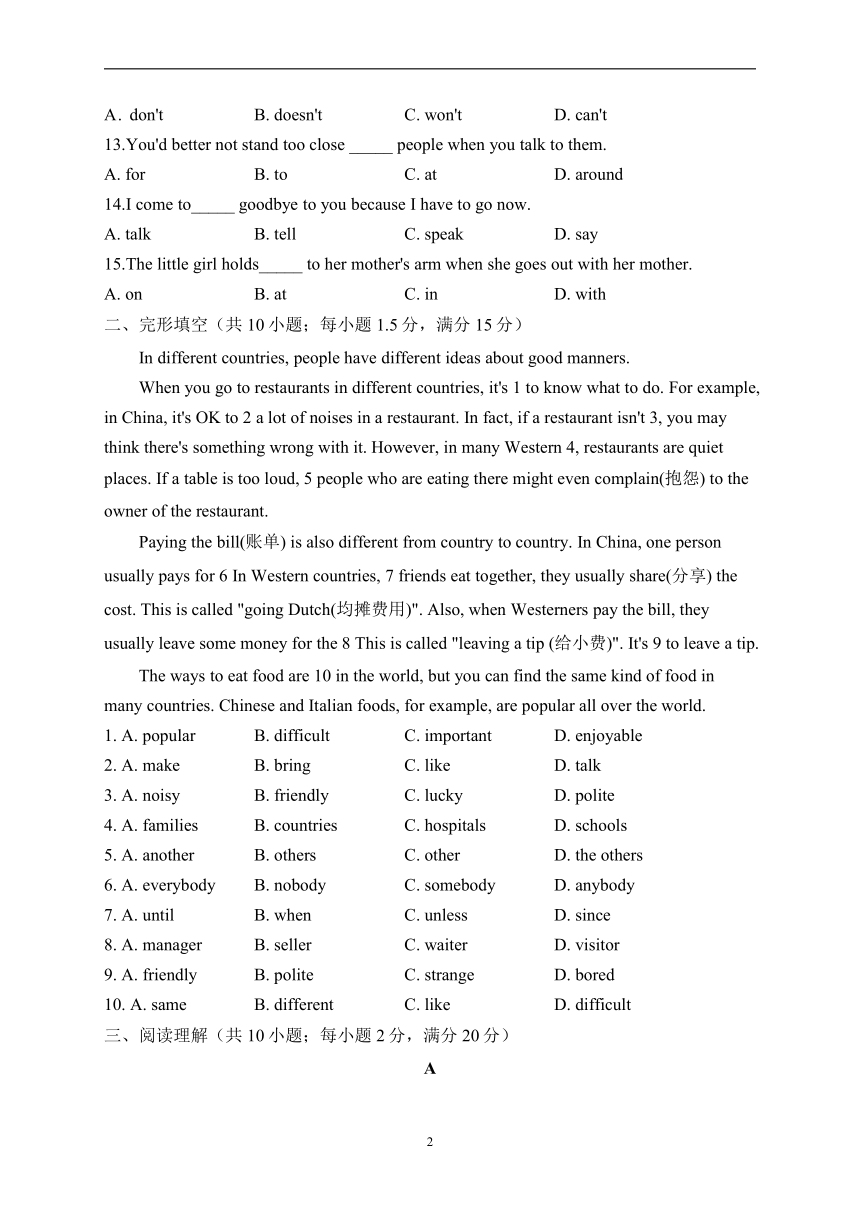
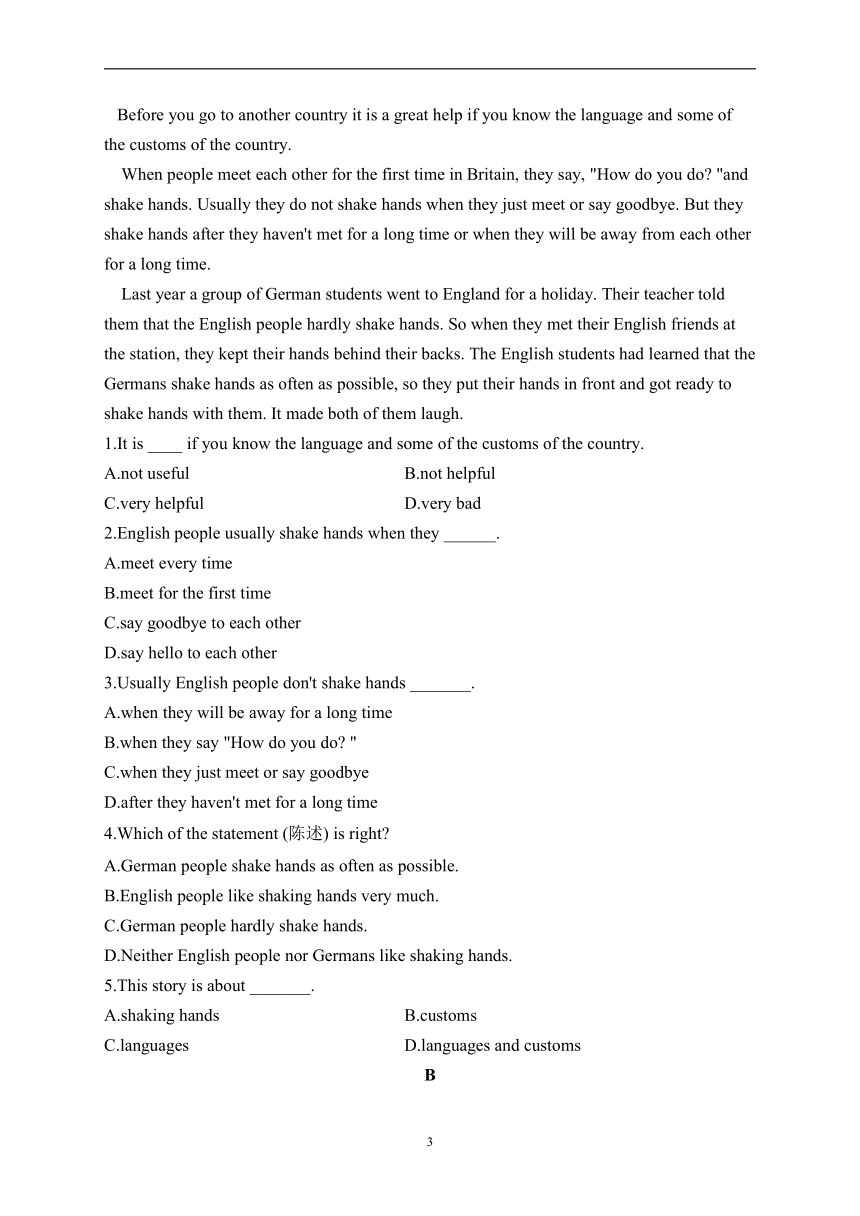
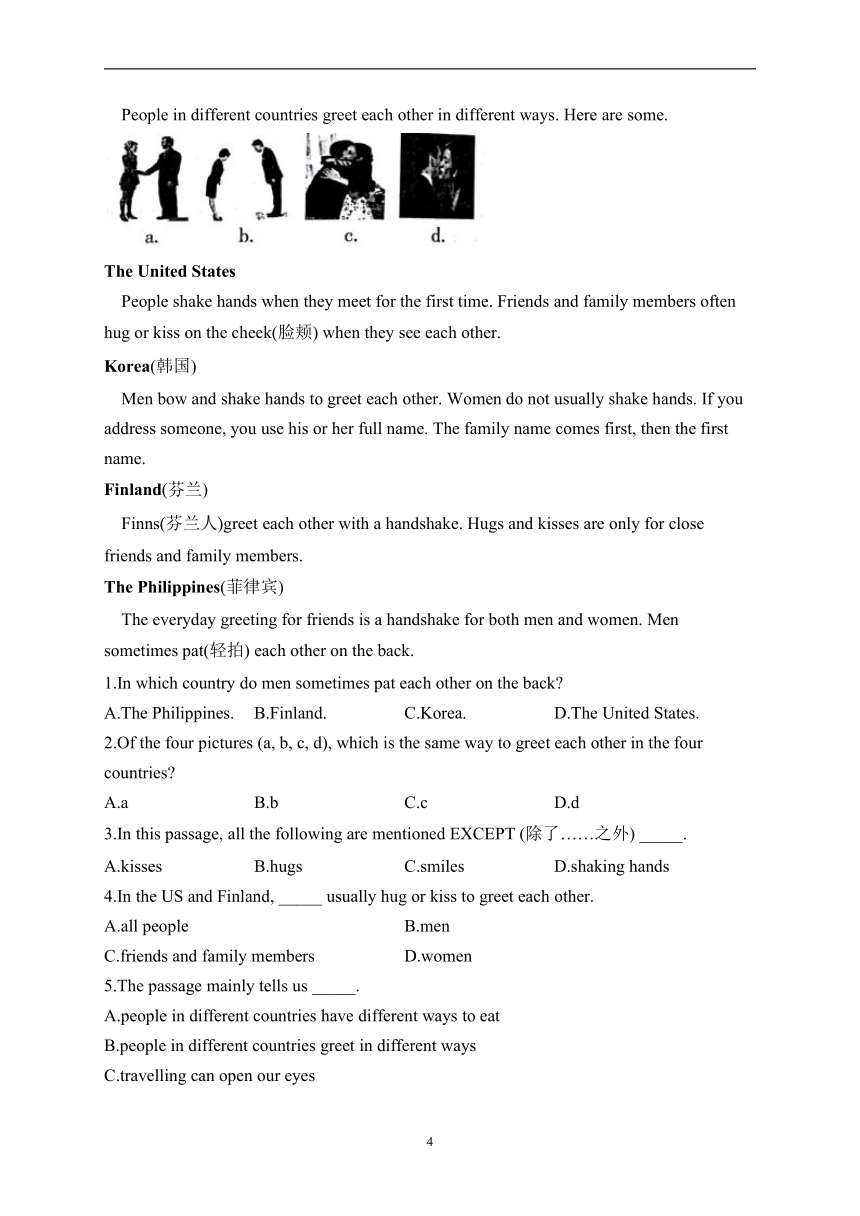
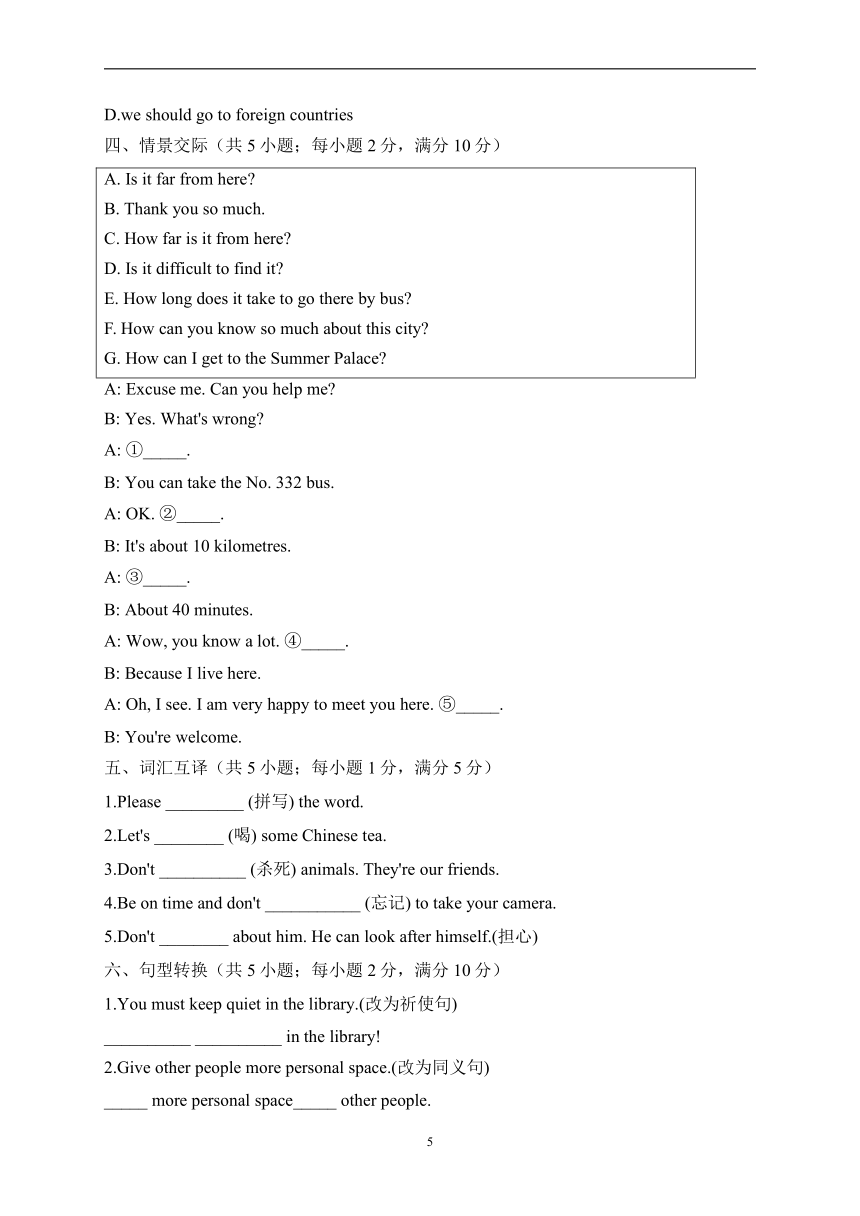
文档简介
Module 11 Body language Unit 3 Language in use
满分:100分
一、单选题(共15小题;每小题1分,满分15分)
1.Eric, ________ go to bed too late.
A.don't B.doesn't C.aren't D.isn't
2.Jerry, ________ dressed now. Everyone is waiting for you.
A.gets B.getting C.get D.to get
3.—The air is fresh now.
—Yes. ________ go out for a walk.
A.Let B.Let is C.Let's D.Let us
4.—Tom, my glasses are in my room. Can you ________ them here for me
—Sure, grandma.
A.bring B.take C.have D.find
5.Stop talking and _________ to me carefully, Bill.
A.listen B.listens C.listening D.to listen
6.—Is there a No. 2 bus stop near here
—Yes. ________ at the traffic lights and you'll find it.
A.Turning left B.Turn left C.To turn left D.Turns left
7.— I'm sorry I left my homework at home. Shall I go and ______ it
— No, you needn't. it here tomorrow.
A.get; Take B.bring; Take C.get; Bring D.carry; Bring
8.Tom, _____________ in class, please!
A.doesn't talk B.don't talk
C.didn't talk D.not talk
9.Don't ________ too many trees. They're good for our environment(环境).
A.sit down B.cut down C.put up D.to cut down
10.—________ in the classroom, Helen.
—Sorry, Mr. Hu.
A.Eat not drinks it. B.Don't eat C.Never eats D.Doesn't eat
11.It's not ________ to talk with your mouth full.
A. boring B. polite C. terrible D. sleepy
12.Daniel, ______ play with the mobile phone while you're walking in the street.
A. don't B. doesn't C. won't D. can't
13.You'd better not stand too close _____ people when you talk to them.
A. for B. to C. at D. around
14.I come to_____ goodbye to you because I have to go now.
A. talk B. tell C. speak D. say
15.The little girl holds_____ to her mother's arm when she goes out with her mother.
A. on B. at C. in D. with
二、完形填空(共10小题;每小题1.5分,满分15分)
In different countries, people have different ideas about good manners.
When you go to restaurants in different countries, it's 1 to know what to do. For example, in China, it's OK to 2 a lot of noises in a restaurant. In fact, if a restaurant isn't 3, you may think there's something wrong with it. However, in many Western 4, restaurants are quiet places. If a table is too loud, 5 people who are eating there might even complain(抱怨) to the owner of the restaurant.
Paying the bill(账单) is also different from country to country. In China, one person usually pays for 6 In Western countries, 7 friends eat together, they usually share(分享) the cost. This is called "going Dutch(均摊费用)". Also, when Westerners pay the bill, they usually leave some money for the 8 This is called "leaving a tip (给小费)". It's 9 to leave a tip.
The ways to eat food are 10 in the world, but you can find the same kind of food in many countries. Chinese and Italian foods, for example, are popular all over the world.
1. A. popular B. difficult C. important D. enjoyable
2. A. make B. bring C. like D. talk
3. A. noisy B. friendly C. lucky D. polite
4. A. families B. countries C. hospitals D. schools
5. A. another B. others C. other D. the others
6. A. everybody B. nobody C. somebody D. anybody
7. A. until B. when C. unless D. since
8. A. manager B. seller C. waiter D. visitor
9. A. friendly B. polite C. strange D. bored
10. A. same B. different C. like D. difficult
三、阅读理解(共10小题;每小题2分,满分20分)
A
Before you go to another country it is a great help if you know the language and some of the customs of the country.
When people meet each other for the first time in Britain, they say, "How do you do "and shake hands. Usually they do not shake hands when they just meet or say goodbye. But they shake hands after they haven't met for a long time or when they will be away from each other for a long time.
Last year a group of German students went to England for a holiday. Their teacher told them that the English people hardly shake hands. So when they met their English friends at the station, they kept their hands behind their backs. The English students had learned that the Germans shake hands as often as possible, so they put their hands in front and got ready to shake hands with them. It made both of them laugh.
1.It is ____ if you know the language and some of the customs of the country.
A.not useful B.not helpful
C.very helpful D.very bad
2.English people usually shake hands when they ______.
A.meet every time
B.meet for the first time
C.say goodbye to each other
D.say hello to each other
3.Usually English people don't shake hands _______.
A.when they will be away for a long time
B.when they say "How do you do "
C.when they just meet or say goodbye
D.after they haven't met for a long time
4.Which of the statement (陈述) is right
A.German people shake hands as often as possible.
B.English people like shaking hands very much.
C.German people hardly shake hands.
D.Neither English people nor Germans like shaking hands.
5.This story is about _______.
A.shaking hands B.customs
C.languages D.languages and customs
B
People in different countries greet each other in different ways. Here are some.
The United States
People shake hands when they meet for the first time. Friends and family members often hug or kiss on the cheek(脸颊) when they see each other.
Korea(韩国)
Men bow and shake hands to greet each other. Women do not usually shake hands. If you address someone, you use his or her full name. The family name comes first, then the first name.
Finland(芬兰)
Finns(芬兰人)greet each other with a handshake. Hugs and kisses are only for close friends and family members.
The Philippines(菲律宾)
The everyday greeting for friends is a handshake for both men and women. Men sometimes pat(轻拍) each other on the back.
1.In which country do men sometimes pat each other on the back
A.The Philippines. B.Finland. C.Korea. D.The United States.
2.Of the four pictures (a, b, c, d), which is the same way to greet each other in the four countries
A.a B.b C.c D.d
3.In this passage, all the following are mentioned EXCEPT (除了……之外) _____.
A.kisses B.hugs C.smiles D.shaking hands
4.In the US and Finland, _____ usually hug or kiss to greet each other.
A.all people B.men
C.friends and family members D.women
5.The passage mainly tells us _____.
A.people in different countries have different ways to eat
B.people in different countries greet in different ways
C.travelling can open our eyes
D.we should go to foreign countries
四、情景交际(共5小题;每小题2分,满分10分)
A. Is it far from here B. Thank you so much. C. How far is it from here D. Is it difficult to find it E. How long does it take to go there by bus F. How can you know so much about this city G. How can I get to the Summer Palace
A: Excuse me. Can you help me
B: Yes. What's wrong
A: ①_____.
B: You can take the No. 332 bus.
A: OK. ②_____.
B: It's about 10 kilometres.
A: ③_____.
B: About 40 minutes.
A: Wow, you know a lot. ④_____.
B: Because I live here.
A: Oh, I see. I am very happy to meet you here. ⑤_____.
B: You're welcome.
五、词汇互译(共5小题;每小题1分,满分5分)
1.Please _________ (拼写) the word.
2.Let's ________ (喝) some Chinese tea.
3.Don't __________ (杀死) animals. They're our friends.
4.Be on time and don't ___________ (忘记) to take your camera.
5.Don't ________ about him. He can look after himself.(担心)
六、句型转换(共5小题;每小题2分,满分10分)
1.You must keep quiet in the library.(改为祈使句)
__________ __________ in the library!
2.Give other people more personal space.(改为同义句)
_____ more personal space_____ other people.
3.If you don't get up early, you'll be late for school.(改为同义句)
_____ _____early, or you'll be late for school.
4.They nodded and shook hands with each other. (改为否定句)
They_____ nod _____ _____ hands with each other.
5.You mustn't cut down too many trees. (改为祈使句)
_____ _____down too many trees.
七、书面表达(共1小题;满分25分)
人们通常使用口头语言进行交流,但是在日常生活 中,人们也会广泛地使用肢体语言。在日常生活中, 你会使用肢体语言与其他人进行交流吗?请以"Body Language"为题,写一篇有关你常见的肢体语言的英 语短文,词数80左右。
内容提示:(1)挥手表示再见;
(2)将食指放在嘴前表示请保持安静;
(3)点头表示同意,摇头表示反对;
(4)不同的国家肢体语言含义不同。
参考词汇:forefinger 食指;respect 尊重;agree with sb同意某人的观点
____________________________________________________________________________________________________________________________________________________________________________________________________________________________________________________________________________________________________________
答案以及解析
一、单选题
1.答案:A
解析:句意:埃里克,别太晚睡觉。考查祈使句的否定形式。此处表示"埃里克,别太晚睡觉。",表示请求、命令的语气,因此用祈使句,且这里表示否定,因此以"don't"开头。故选A。
2.答案:C
解析:句意:杰瑞,现在穿上衣服。每个人都在等你。考查祈使句。这是祈使句的肯定结构,用动词原形。表达"穿衣服"用短语"get dressed"。故选C。
3.答案:C
解析:句意:——现在空气新鲜。——对。我们出去散散步吧。考查let's的用法。由句意可知空处所在句是表示建议、邀请。所以用Let's。故选C。
4.答案:A
解析:句意:——汤姆,我的眼镜在我房间里。你能帮我拿过来吗 ——当然可以,奶奶。考查动词辨析。bring带来;take拿走;have有;find找到。根据"Tom, my glasses are in my room. Can you...them here for me "可知,奶奶请汤姆把眼镜拿过来。故选A。
5.答案:A
解析:句意:比尔,停止讲话,认真听我说。考查祈使句。根据"Stop"动词原形放句首,可知是祈使句的肯定句形式,根据"and"可知用动词原形形成并列结构。表达"听"用动词"listen"。故选A。
6.答案:B
解析:句意:——这附近有2路公共汽车站吗?——对。在红绿灯处向左拐,你就会找到它。考查祈使句用法。根据"...at the traffic lights and you'll find it."可知这是一个祈使句,以动词原形开头。故选B。
7.答案:C
解析:句意:——对不起,我把作业忘在家里了。我去拿好吗?——不,你不需要。明天把它带到这儿来。考查动词辨析。get去取;carry携带;bring带来;take带走,根据"I'm sorry I left my homework at home"可知,应该是去取,所以第一个空用get,排除B和D,由第二个空后的"it here tomorrow"可知,应该是明天带来,用bring,排除A。故选C。
8.答案:B
解析:句意:汤姆,请不要在课堂上讲话!考查祈使句。句子没有主语,可知是否定祈使句,其句式为"don't +动词原形+..."。故选B。
9.答案:B
解析:句意:不要砍太多的树。它们对我们的环境有好处。考查动词短语辨析。sit down坐下;cut down砍倒;put up举起。根据"Don't...too many trees. They're good for our environment."可知,不要砍太多的树,用在祈使句中,使用动词原形。故选B。
10.答案:B
解析:句意:——海伦,不要在教室里吃东西。——对不起,胡老师。考查祈使句的用法。祈使句的否定形式是"Don't+动词原形",表示"不要做某事"。故选B。
11.答案:B
解析:boring意为"无聊的";polite意为"礼貌的"; terrible意为"非常讨厌的" ;sleepy意为"困倦的"。 根据 talk with your mouth full 可知.。故选 B 。
12.答案:A
解析:考查祈使句的用法。祈使句表示"命令" "请 求" "建议"等含义,动词用原形,其否定形式是在动词 前加don't或never(加强语气)。
13.答案:B
解析:句意为:当你和人交谈的时候,最好不要站得太近。close to意为"离……近",为固定搭配。故选B。
14.答案:D
解析:句意为:我来是向你告别的,因为我现在不得不走了。say goodbye to sb是固定用法,意为"向某人说再见"。故选D。
15.答案:A
解析:句意为:这个小女孩和妈妈一起出去的时候紧紧抓着她妈妈的胳膊。hold on to意为"紧紧抓住",为固定搭配。故选A。
二、完形填空
答案:1-5CAABC 6-10ABCBB
解析:1.此处表示当你去不同国家的餐馆时,知道做什么是很重要的。故选C。
2.make noises为固定搭配,意为"制造噪声"。故选A。
3.根据上文的noises可推知此处表示"如果一个餐馆不嘈杂,你可能觉得它有问题"。noisy意为"吵闹的"。故选A。
4.由上文in different countries可知此处指西方国家。故选B。
5.another意为"另一;又一",后接可数名词单数;the other指两个中的"另一个";others泛指 "另外的人或事物";other指"其余的",后接可数名词复数形式。由空后的people可知应选C。
6.根据语境可知此处指在中国,一个人为每个人付账,everybody意为"人人;每个人"。故选 A。
7.此处指当西方人吃饭时,when意为"当…… 的时候",符合语境。故选B。
8.根据语境可知,此处指给服务员留小费。故选C。
9.结合语境可知,此处指留下小费是有礼貌的。friendly意为"友好的"; polite意为"礼貌的";strange意为"奇怪的";bored意为"厌倦的"。故选B。
10.由后文but和same可知此处指在世界上,吃食物的方式是不同的。故选B。
三、阅读理解
A
答案:1.C; 2.B; 3.C; 4.A; 5.D
解析:1.根据文章内容Before you go to another country it is a great help if you know the language and some of the customs of the country. 可知是非常有帮助的;故选C
2.根据文章内容,When people meet each other for the first time in Britain, they say, "How do you do "and shake hands. ,可知是英国人第一次见面时握手;故选B
3.根据文章内容Usually they do not shake hands when they just meet or say goodbye可知当他们正好遇到或再见时不握手;故选C。
4.根据文章the Germans shake hands as often as possible可知德国人尽可能经常的握手;故选A。
5.根据Before you go to another country it is a great help if you know the language and some of the customs of the country.和文章内容,可知是介绍语言与风俗习惯的文章;故选D。
B
答案:1-5 AACCB
解析:1.细节理解题。根据The Philippines (菲律宾) The everyday greeting for friends is a handshake for both men and women. Men sometimes pat (轻拍) each other on the back.可知,在菲律宾,男子互相轻拍彼此的背来问候。故选A。
2.推理判断题。根据People shake hands when they meet for the first time.和Men bow and shake hands to greet each other.和Finns (芬兰人) greet each other with a handshake.和The everyday greeting for friends is a handshake for both men and women.可知,这四个国家见面问候,相同的方式是握手。故选A。
3.推理判断题。根据People shake hands when they meet for the first time. Friends and family members often hug or kiss on the cheek (脸颊) when they see each other.可知,文中提到的问候方式有:握手,拥抱和亲吻脸颊,因此没有提到微笑。故选C。
4.推理判断题。根据The United States People shake hands when they meet for the first time. Friends and family members often hug or kiss on the cheek (脸颊) when they see each other.在Finland (芬兰), Finns (芬兰人) greet each other with a handshake. Hugs and kisses are only for close friends and family members.可知,在美国和在芬兰,朋友和家人拥抱和亲吻来问候。故选C。
5.概括归纳题。根据People in different countries greet each other in different ways.可知,本文主要介绍了不同国家用不同的方式来问候。故选B。
四、情景交际
答案:①-⑤GCEFB
解析:①由下一句"You can take the No. 332 bus."可知,此处是在问路。故选G。
②由下一句"It's about 10 kilometres."可知,此处是询问距离。故选C。
③由下一句"About 40 minutes."可知,此处是在询问需要多长时间。故选E。
④由"Wow, you know a lot."和"Because I live here. "可知,此处是询问对方为什么知道这么多关于这座城市的事情。故选F。
⑤由下一句"You're welcome."可知,此处是在感谢对方。故选B。
五、词汇互译
1.答案:spell
2.答案:drink
3.答案:kill
4.答案:forget
5.答案:worry
六、句型转换
1.答案:Keep quiet
2.答案:Give; to
3.答案:Get up
4.答案:didn't; or shake
5.答案:Don't cut/Never cut
七、书面表达
答案:
Body Language
In our everyday life, we often use body language. Here are some examples. When we want to say goodbye, we usually wave our hands. We put the forefinger in front of our mouth to say "Please be quiet." When we agree with someone, we nod our heads. We can shake our heads to say no.
But body language is different in different countries. So it is polite to understand and respect the body language of other countries when we talk with each other.
2
满分:100分
一、单选题(共15小题;每小题1分,满分15分)
1.Eric, ________ go to bed too late.
A.don't B.doesn't C.aren't D.isn't
2.Jerry, ________ dressed now. Everyone is waiting for you.
A.gets B.getting C.get D.to get
3.—The air is fresh now.
—Yes. ________ go out for a walk.
A.Let B.Let is C.Let's D.Let us
4.—Tom, my glasses are in my room. Can you ________ them here for me
—Sure, grandma.
A.bring B.take C.have D.find
5.Stop talking and _________ to me carefully, Bill.
A.listen B.listens C.listening D.to listen
6.—Is there a No. 2 bus stop near here
—Yes. ________ at the traffic lights and you'll find it.
A.Turning left B.Turn left C.To turn left D.Turns left
7.— I'm sorry I left my homework at home. Shall I go and ______ it
— No, you needn't. it here tomorrow.
A.get; Take B.bring; Take C.get; Bring D.carry; Bring
8.Tom, _____________ in class, please!
A.doesn't talk B.don't talk
C.didn't talk D.not talk
9.Don't ________ too many trees. They're good for our environment(环境).
A.sit down B.cut down C.put up D.to cut down
10.—________ in the classroom, Helen.
—Sorry, Mr. Hu.
A.Eat not drinks it. B.Don't eat C.Never eats D.Doesn't eat
11.It's not ________ to talk with your mouth full.
A. boring B. polite C. terrible D. sleepy
12.Daniel, ______ play with the mobile phone while you're walking in the street.
A. don't B. doesn't C. won't D. can't
13.You'd better not stand too close _____ people when you talk to them.
A. for B. to C. at D. around
14.I come to_____ goodbye to you because I have to go now.
A. talk B. tell C. speak D. say
15.The little girl holds_____ to her mother's arm when she goes out with her mother.
A. on B. at C. in D. with
二、完形填空(共10小题;每小题1.5分,满分15分)
In different countries, people have different ideas about good manners.
When you go to restaurants in different countries, it's 1 to know what to do. For example, in China, it's OK to 2 a lot of noises in a restaurant. In fact, if a restaurant isn't 3, you may think there's something wrong with it. However, in many Western 4, restaurants are quiet places. If a table is too loud, 5 people who are eating there might even complain(抱怨) to the owner of the restaurant.
Paying the bill(账单) is also different from country to country. In China, one person usually pays for 6 In Western countries, 7 friends eat together, they usually share(分享) the cost. This is called "going Dutch(均摊费用)". Also, when Westerners pay the bill, they usually leave some money for the 8 This is called "leaving a tip (给小费)". It's 9 to leave a tip.
The ways to eat food are 10 in the world, but you can find the same kind of food in many countries. Chinese and Italian foods, for example, are popular all over the world.
1. A. popular B. difficult C. important D. enjoyable
2. A. make B. bring C. like D. talk
3. A. noisy B. friendly C. lucky D. polite
4. A. families B. countries C. hospitals D. schools
5. A. another B. others C. other D. the others
6. A. everybody B. nobody C. somebody D. anybody
7. A. until B. when C. unless D. since
8. A. manager B. seller C. waiter D. visitor
9. A. friendly B. polite C. strange D. bored
10. A. same B. different C. like D. difficult
三、阅读理解(共10小题;每小题2分,满分20分)
A
Before you go to another country it is a great help if you know the language and some of the customs of the country.
When people meet each other for the first time in Britain, they say, "How do you do "and shake hands. Usually they do not shake hands when they just meet or say goodbye. But they shake hands after they haven't met for a long time or when they will be away from each other for a long time.
Last year a group of German students went to England for a holiday. Their teacher told them that the English people hardly shake hands. So when they met their English friends at the station, they kept their hands behind their backs. The English students had learned that the Germans shake hands as often as possible, so they put their hands in front and got ready to shake hands with them. It made both of them laugh.
1.It is ____ if you know the language and some of the customs of the country.
A.not useful B.not helpful
C.very helpful D.very bad
2.English people usually shake hands when they ______.
A.meet every time
B.meet for the first time
C.say goodbye to each other
D.say hello to each other
3.Usually English people don't shake hands _______.
A.when they will be away for a long time
B.when they say "How do you do "
C.when they just meet or say goodbye
D.after they haven't met for a long time
4.Which of the statement (陈述) is right
A.German people shake hands as often as possible.
B.English people like shaking hands very much.
C.German people hardly shake hands.
D.Neither English people nor Germans like shaking hands.
5.This story is about _______.
A.shaking hands B.customs
C.languages D.languages and customs
B
People in different countries greet each other in different ways. Here are some.
The United States
People shake hands when they meet for the first time. Friends and family members often hug or kiss on the cheek(脸颊) when they see each other.
Korea(韩国)
Men bow and shake hands to greet each other. Women do not usually shake hands. If you address someone, you use his or her full name. The family name comes first, then the first name.
Finland(芬兰)
Finns(芬兰人)greet each other with a handshake. Hugs and kisses are only for close friends and family members.
The Philippines(菲律宾)
The everyday greeting for friends is a handshake for both men and women. Men sometimes pat(轻拍) each other on the back.
1.In which country do men sometimes pat each other on the back
A.The Philippines. B.Finland. C.Korea. D.The United States.
2.Of the four pictures (a, b, c, d), which is the same way to greet each other in the four countries
A.a B.b C.c D.d
3.In this passage, all the following are mentioned EXCEPT (除了……之外) _____.
A.kisses B.hugs C.smiles D.shaking hands
4.In the US and Finland, _____ usually hug or kiss to greet each other.
A.all people B.men
C.friends and family members D.women
5.The passage mainly tells us _____.
A.people in different countries have different ways to eat
B.people in different countries greet in different ways
C.travelling can open our eyes
D.we should go to foreign countries
四、情景交际(共5小题;每小题2分,满分10分)
A. Is it far from here B. Thank you so much. C. How far is it from here D. Is it difficult to find it E. How long does it take to go there by bus F. How can you know so much about this city G. How can I get to the Summer Palace
A: Excuse me. Can you help me
B: Yes. What's wrong
A: ①_____.
B: You can take the No. 332 bus.
A: OK. ②_____.
B: It's about 10 kilometres.
A: ③_____.
B: About 40 minutes.
A: Wow, you know a lot. ④_____.
B: Because I live here.
A: Oh, I see. I am very happy to meet you here. ⑤_____.
B: You're welcome.
五、词汇互译(共5小题;每小题1分,满分5分)
1.Please _________ (拼写) the word.
2.Let's ________ (喝) some Chinese tea.
3.Don't __________ (杀死) animals. They're our friends.
4.Be on time and don't ___________ (忘记) to take your camera.
5.Don't ________ about him. He can look after himself.(担心)
六、句型转换(共5小题;每小题2分,满分10分)
1.You must keep quiet in the library.(改为祈使句)
__________ __________ in the library!
2.Give other people more personal space.(改为同义句)
_____ more personal space_____ other people.
3.If you don't get up early, you'll be late for school.(改为同义句)
_____ _____early, or you'll be late for school.
4.They nodded and shook hands with each other. (改为否定句)
They_____ nod _____ _____ hands with each other.
5.You mustn't cut down too many trees. (改为祈使句)
_____ _____down too many trees.
七、书面表达(共1小题;满分25分)
人们通常使用口头语言进行交流,但是在日常生活 中,人们也会广泛地使用肢体语言。在日常生活中, 你会使用肢体语言与其他人进行交流吗?请以"Body Language"为题,写一篇有关你常见的肢体语言的英 语短文,词数80左右。
内容提示:(1)挥手表示再见;
(2)将食指放在嘴前表示请保持安静;
(3)点头表示同意,摇头表示反对;
(4)不同的国家肢体语言含义不同。
参考词汇:forefinger 食指;respect 尊重;agree with sb同意某人的观点
____________________________________________________________________________________________________________________________________________________________________________________________________________________________________________________________________________________________________________
答案以及解析
一、单选题
1.答案:A
解析:句意:埃里克,别太晚睡觉。考查祈使句的否定形式。此处表示"埃里克,别太晚睡觉。",表示请求、命令的语气,因此用祈使句,且这里表示否定,因此以"don't"开头。故选A。
2.答案:C
解析:句意:杰瑞,现在穿上衣服。每个人都在等你。考查祈使句。这是祈使句的肯定结构,用动词原形。表达"穿衣服"用短语"get dressed"。故选C。
3.答案:C
解析:句意:——现在空气新鲜。——对。我们出去散散步吧。考查let's的用法。由句意可知空处所在句是表示建议、邀请。所以用Let's。故选C。
4.答案:A
解析:句意:——汤姆,我的眼镜在我房间里。你能帮我拿过来吗 ——当然可以,奶奶。考查动词辨析。bring带来;take拿走;have有;find找到。根据"Tom, my glasses are in my room. Can you...them here for me "可知,奶奶请汤姆把眼镜拿过来。故选A。
5.答案:A
解析:句意:比尔,停止讲话,认真听我说。考查祈使句。根据"Stop"动词原形放句首,可知是祈使句的肯定句形式,根据"and"可知用动词原形形成并列结构。表达"听"用动词"listen"。故选A。
6.答案:B
解析:句意:——这附近有2路公共汽车站吗?——对。在红绿灯处向左拐,你就会找到它。考查祈使句用法。根据"...at the traffic lights and you'll find it."可知这是一个祈使句,以动词原形开头。故选B。
7.答案:C
解析:句意:——对不起,我把作业忘在家里了。我去拿好吗?——不,你不需要。明天把它带到这儿来。考查动词辨析。get去取;carry携带;bring带来;take带走,根据"I'm sorry I left my homework at home"可知,应该是去取,所以第一个空用get,排除B和D,由第二个空后的"it here tomorrow"可知,应该是明天带来,用bring,排除A。故选C。
8.答案:B
解析:句意:汤姆,请不要在课堂上讲话!考查祈使句。句子没有主语,可知是否定祈使句,其句式为"don't +动词原形+..."。故选B。
9.答案:B
解析:句意:不要砍太多的树。它们对我们的环境有好处。考查动词短语辨析。sit down坐下;cut down砍倒;put up举起。根据"Don't...too many trees. They're good for our environment."可知,不要砍太多的树,用在祈使句中,使用动词原形。故选B。
10.答案:B
解析:句意:——海伦,不要在教室里吃东西。——对不起,胡老师。考查祈使句的用法。祈使句的否定形式是"Don't+动词原形",表示"不要做某事"。故选B。
11.答案:B
解析:boring意为"无聊的";polite意为"礼貌的"; terrible意为"非常讨厌的" ;sleepy意为"困倦的"。 根据 talk with your mouth full 可知.。故选 B 。
12.答案:A
解析:考查祈使句的用法。祈使句表示"命令" "请 求" "建议"等含义,动词用原形,其否定形式是在动词 前加don't或never(加强语气)。
13.答案:B
解析:句意为:当你和人交谈的时候,最好不要站得太近。close to意为"离……近",为固定搭配。故选B。
14.答案:D
解析:句意为:我来是向你告别的,因为我现在不得不走了。say goodbye to sb是固定用法,意为"向某人说再见"。故选D。
15.答案:A
解析:句意为:这个小女孩和妈妈一起出去的时候紧紧抓着她妈妈的胳膊。hold on to意为"紧紧抓住",为固定搭配。故选A。
二、完形填空
答案:1-5CAABC 6-10ABCBB
解析:1.此处表示当你去不同国家的餐馆时,知道做什么是很重要的。故选C。
2.make noises为固定搭配,意为"制造噪声"。故选A。
3.根据上文的noises可推知此处表示"如果一个餐馆不嘈杂,你可能觉得它有问题"。noisy意为"吵闹的"。故选A。
4.由上文in different countries可知此处指西方国家。故选B。
5.another意为"另一;又一",后接可数名词单数;the other指两个中的"另一个";others泛指 "另外的人或事物";other指"其余的",后接可数名词复数形式。由空后的people可知应选C。
6.根据语境可知此处指在中国,一个人为每个人付账,everybody意为"人人;每个人"。故选 A。
7.此处指当西方人吃饭时,when意为"当…… 的时候",符合语境。故选B。
8.根据语境可知,此处指给服务员留小费。故选C。
9.结合语境可知,此处指留下小费是有礼貌的。friendly意为"友好的"; polite意为"礼貌的";strange意为"奇怪的";bored意为"厌倦的"。故选B。
10.由后文but和same可知此处指在世界上,吃食物的方式是不同的。故选B。
三、阅读理解
A
答案:1.C; 2.B; 3.C; 4.A; 5.D
解析:1.根据文章内容Before you go to another country it is a great help if you know the language and some of the customs of the country. 可知是非常有帮助的;故选C
2.根据文章内容,When people meet each other for the first time in Britain, they say, "How do you do "and shake hands. ,可知是英国人第一次见面时握手;故选B
3.根据文章内容Usually they do not shake hands when they just meet or say goodbye可知当他们正好遇到或再见时不握手;故选C。
4.根据文章the Germans shake hands as often as possible可知德国人尽可能经常的握手;故选A。
5.根据Before you go to another country it is a great help if you know the language and some of the customs of the country.和文章内容,可知是介绍语言与风俗习惯的文章;故选D。
B
答案:1-5 AACCB
解析:1.细节理解题。根据The Philippines (菲律宾) The everyday greeting for friends is a handshake for both men and women. Men sometimes pat (轻拍) each other on the back.可知,在菲律宾,男子互相轻拍彼此的背来问候。故选A。
2.推理判断题。根据People shake hands when they meet for the first time.和Men bow and shake hands to greet each other.和Finns (芬兰人) greet each other with a handshake.和The everyday greeting for friends is a handshake for both men and women.可知,这四个国家见面问候,相同的方式是握手。故选A。
3.推理判断题。根据People shake hands when they meet for the first time. Friends and family members often hug or kiss on the cheek (脸颊) when they see each other.可知,文中提到的问候方式有:握手,拥抱和亲吻脸颊,因此没有提到微笑。故选C。
4.推理判断题。根据The United States People shake hands when they meet for the first time. Friends and family members often hug or kiss on the cheek (脸颊) when they see each other.在Finland (芬兰), Finns (芬兰人) greet each other with a handshake. Hugs and kisses are only for close friends and family members.可知,在美国和在芬兰,朋友和家人拥抱和亲吻来问候。故选C。
5.概括归纳题。根据People in different countries greet each other in different ways.可知,本文主要介绍了不同国家用不同的方式来问候。故选B。
四、情景交际
答案:①-⑤GCEFB
解析:①由下一句"You can take the No. 332 bus."可知,此处是在问路。故选G。
②由下一句"It's about 10 kilometres."可知,此处是询问距离。故选C。
③由下一句"About 40 minutes."可知,此处是在询问需要多长时间。故选E。
④由"Wow, you know a lot."和"Because I live here. "可知,此处是询问对方为什么知道这么多关于这座城市的事情。故选F。
⑤由下一句"You're welcome."可知,此处是在感谢对方。故选B。
五、词汇互译
1.答案:spell
2.答案:drink
3.答案:kill
4.答案:forget
5.答案:worry
六、句型转换
1.答案:Keep quiet
2.答案:Give; to
3.答案:Get up
4.答案:didn't; or shake
5.答案:Don't cut/Never cut
七、书面表达
答案:
Body Language
In our everyday life, we often use body language. Here are some examples. When we want to say goodbye, we usually wave our hands. We put the forefinger in front of our mouth to say "Please be quiet." When we agree with someone, we nod our heads. We can shake our heads to say no.
But body language is different in different countries. So it is polite to understand and respect the body language of other countries when we talk with each other.
2
同课章节目录
- Module 1 Lost and found
- Unit 1 Whose bag is this?
- Unit 2 Are they yours?
- Unit 3 Language in use
- Module 2 What can you do ?
- Unit 1 I can play the piano
- Unit 2 I can run really fast
- Unit 3 Language in use
- Module 3 Making plans
- Unit 1 What are you going to do at the weekends?
- Unit 2 We're going to cheer the players.
- Unit 3 Language in use
- Module 4 Life in the future
- Unit 1 Everyone will study at home
- Unit 2 Every family will have a small plane.
- Unit 3 Language in use
- Module 5 Shopping
- Unit 1 What can I do for you?
- Unit 2 You can buy everything on the Internet
- Unit 3 Language in use
- Module 6 Around town
- Unit 1 Could you tell me how to get to the Nationa
- Unit 2 The London Eye is on your right.
- Unit 3 Language in use
- Revision module A
- Module 7 My past life
- Unit 1 I was born in a small village.
- Unit 2 I was born in Quincy.
- Unit 3 Language in use
- Module 8 Story time
- Unit 1 Once upon a time….
- Unit 2 Goldilocks hurried out of the house.
- Unit 3 Language in use
- Module 9 Life history
- Unit 1 He left school and began work at the age of
- Unit 2 He decided to be an actor.
- Unit 3 Language in use
- Module 10 A holiday journey
- Unit 1 What did you do?
- Unit 2 This morning we took a walk.
- Unit 3 Language in use
- Module 11 Body language
- Unit 1 They touch noses!
- Unit 2 Here are some ways to welcome them.
- Unit 3 Language in use
- Module 12 Western music
- Unit 1 It's so beautiful!
- Unit 2 Vienna is the centre of European classical
- Unit 3 Language in use
- Revision module B
